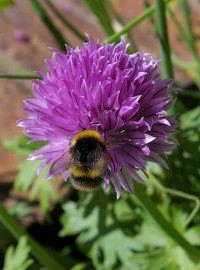A Fragrant Winter Flowering Shrub For Bees - Daphne bholua 'Jacqueline Postill'
One of the loveliest winter flowering shrubs for bees has to be Daphne bholua 'Jacqueline Postill'. The pretty pink flowers produce a truly captivating, intense fragrance - no wonder the bees can't resist it! When my husband and I caught a whiff of the gorgeous scent wafting by on a cool winter breeze, we too were eager to locate the source of the heavenly perfume.
The flowers of Daphne bholua provide a helpful source of nectar and pollen, particularly for early-emerging queen bumble bees needing to feed after waking from their winter snooze, and foraging worker honey bees collecting food for their hungry colonies.
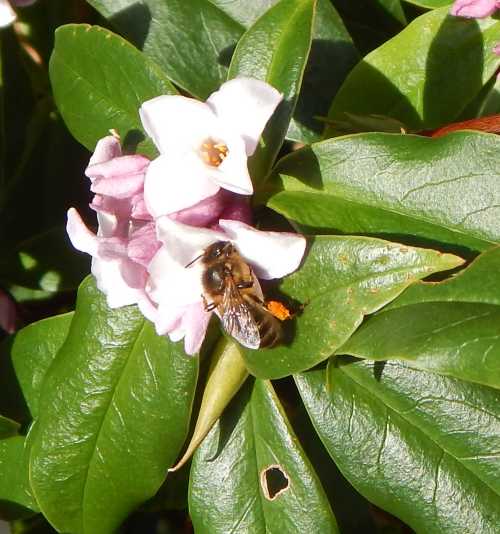 A fragrant winter flowering shrub for bees - Daphne bholua 'Jaqueline Postill'. Above a honey bee visiting the pretty, fragrant pink flowers in January.
A fragrant winter flowering shrub for bees - Daphne bholua 'Jaqueline Postill'. Above a honey bee visiting the pretty, fragrant pink flowers in January.In Nepal in the eastern Himalayas where it originates, Daphne bholua forms an upright evergreen shrub, but in other climates it is deciduous. The RHS regard it as deciduous shrub, losing its leaves in autumn, with fresh foliage appearing early the following year.
The name of this shrub is commonly shortened to 'Daphne', but it is also known as the 'Nepalese paper plant'.
According to some sources of information, it flowers in March. However, the photographs on this page were taken in the middle of January 2020, at a temperature of 8°C (46°F), and in February the year before. This experience confirms the RHS view of flowering period, but it may depend on the region in which it is grown.
The flowers are followed by dark purple-black berries.
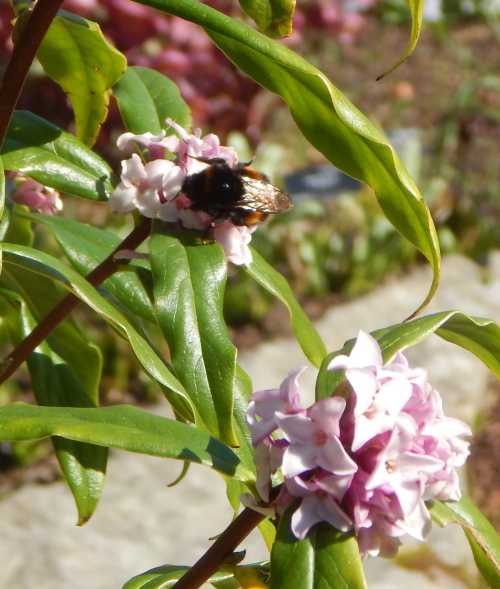 Daphne bholua is a helpful source of nectar and pollen for early-emerging queen bumble bees.
Daphne bholua is a helpful source of nectar and pollen for early-emerging queen bumble bees.Which pollinators are attracted to Daphne?
Given that this shrub flowers so early, it may surprise some people to learn that pollinators are around to visit them, despite the cool temperature.
However, as you can see from the photographs, the flowers on this shrub had tempted not only foraging workers from a colony of wild honey bees, but also bumble bees and even comma butterflies, despite the chilly temperature on cold January and February days.
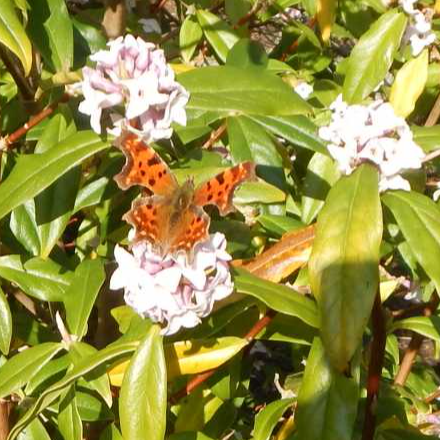 Comma butterfly on Daphne bholua in February.
Comma butterfly on Daphne bholua in February.Planting Daphne bholua for bees and pollinators
Daphne is reputedly difficult to propagate and slow growing, yet well worth the wait. The shrubs can be purchased as established pot plants to add to a sunny, sheltered spot in the garden. They'll thrive best in moderately fertile, well-drained, humus-rich soil.
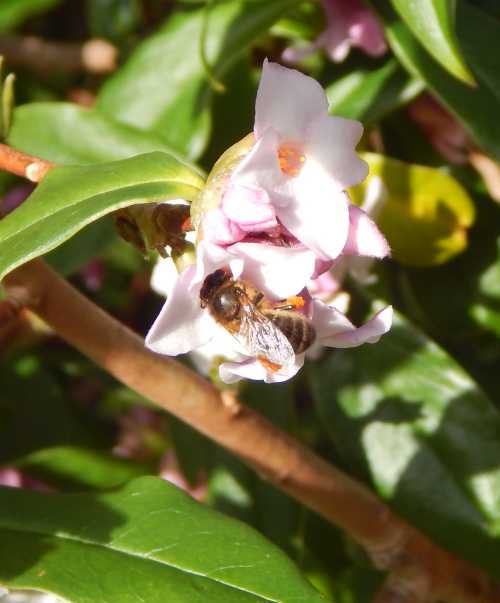 Honey bees love the pollen and nectar-rich flowers of Daphne bholua.
Honey bees love the pollen and nectar-rich flowers of Daphne bholua.Ideally, I think it's best to place it in a location where you may benefit not only from the visual display, but also the fragrance, so perhaps close to a path or seating area.
Once you have identified the perfect spot for this shrub, you'll need to leave it there, because this shrub does not like the disturbance of being moved.
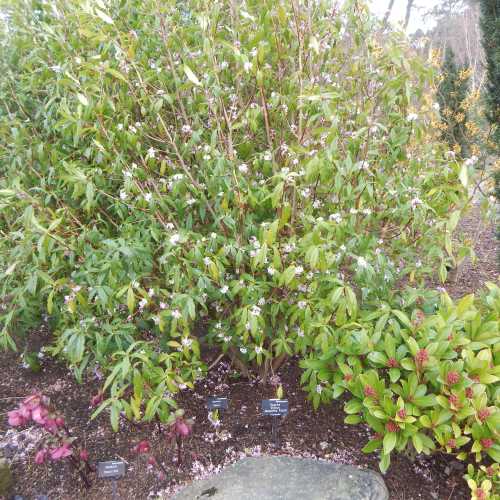 Though slow growing, Daphne bholua 'Jacqueline Postill' could eventually reach about 4m in height, and has a spread of up to 1.5m.
Though slow growing, Daphne bholua 'Jacqueline Postill' could eventually reach about 4m in height, and has a spread of up to 1.5m.
Though slow-growing, it could eventually reach about 4m in height, and has a spread of up to 1.5m. It should only be pruned when necessary.
A few words of caution: Daphne bholua 'Jacqueline Postill' may be attractive to bees, but they are toxic to humans, livestock and pets. The sap is also a skin irritant, and so it's best to wear gloves when handling and avoid contact with the eyes.
If you found this page helpful or interesting, I'd really be grateful if you would share it with others - if not this page, perhaps another, such as Gardening For Bees.
Thank you so much :) .
